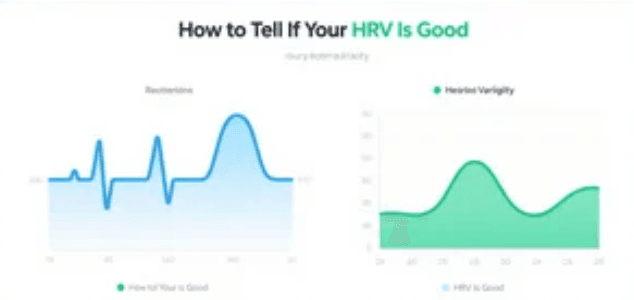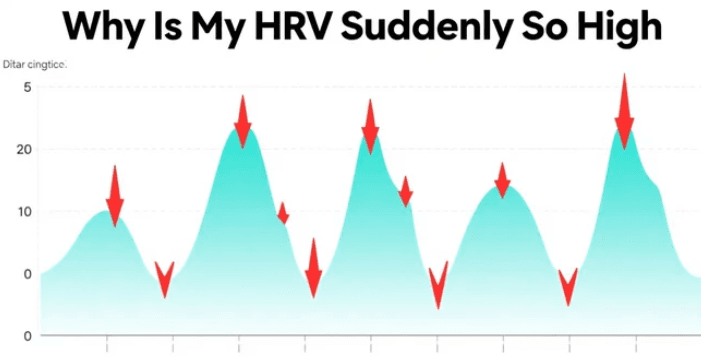Why Is My HRV Suddenly So High? Causes & What It Means
Heart Rate Variability (HRV) is a powerful metric that reflects your nervous system’s balance and overall health. While most people focus on low HRV (often linked to stress or fatigue), a sudden spike in HRV can also be surprising.
If you’ve noticed your HRV is unusually high, you might wonder: Is this good? Is something wrong? In this guide, we’ll explore why HRV spikes happen, whether it’s beneficial, and how to monitor it accurately—including using advanced tools like BodyWave app for deeper insights.
What Does a High HRV Mean?
HRV measures the variation in time between heartbeats, controlled by your autonomic nervous system. Generally:
-
Higher HRV = Strong parasympathetic ("rest-and-digest") activity, better recovery, and adaptability.
-
Lower HRV = Sympathetic ("fight-or-flight") dominance, often due to stress or fatigue.
A sudden high HRV can indicate:
✔ Excellent recovery (after restful sleep or relaxation)
✔ Peak fitness (athletes often have elevated HRV)
✔ Effective stress management (meditation, deep breathing)
✔ Hormonal or metabolic changes (temporary fluctuations)
However, in rare cases, an abnormally high HRV could signal an underlying issue, like an overactive parasympathetic response.
Common Reasons for a Sudden HRV Increase
1. Improved Recovery & Rest
If you’ve prioritized sleep, reduced stress, or taken a rest day, your HRV may surge as your body enters deep recovery.
2. Effective Training Adaptation
Athletes often see HRV rise after a deload week or periodized training, signaling supercompensation.
3. Reduced Stress Levels
Mindfulness, meditation, or a relaxing vacation can shift nervous system balance, boosting HRV.
4. Hydration & Nutrition Optimization
Electrolyte balance (sodium, potassium, magnesium) supports nervous system function, potentially raising HRV.
5. Device or Measurement Variability
Sometimes, a "high HRV" reading is due to:
-
Wearing a different sensor (chest strap vs. optical)
-
Testing at a different time (morning HRV is usually highest)
-
Temporary signal interference
For the most accurate tracking, use a reliable tool like BodyWave app, which minimizes inconsistencies with advanced algorithms.
Is a High HRV Always Good?
Mostly yes, but exceptions exist:
✅ Normal: Gradual increase from fitness gains or lifestyle improvements.
⚠ Concerning: An extreme, unexplained spike (e.g., 2–3x your baseline) could indicate:
-
Vagal overload (excessive parasympathetic activity)
-
Bradycardia (abnormally slow heart rate)
-
Metabolic/hormonal shifts (e.g., thyroid dysfunction)
If your HRV is consistently and unusually high without obvious causes, consult a doctor.
How to Track HRV Trends Accurately
To determine whether your high HRV is meaningful:
-
Measure consistently (same time, ideally morning).
-
Use a reliable device (chest strap > optical sensor).
-
Look at long-term trends (not single-day spikes).
For seamless tracking, BodyWave app provides detailed HRV trends alongside sleep, activity, and stress data—helping you spot patterns and correlations.
When to Be Concerned About High HRV
Seek medical advice if your HRV surge accompanies:
-
Dizziness or fatigue
-
Exceptionally low resting heart rate (<40 bpm)
-
Shortness of breath
-
History of heart conditions
Otherwise, enjoy the boost—it likely means your body is thriving!
How to Maintain Optimal HRV
To sustain (or safely elevate) your HRV:
-
Sleep 7–9 hours nightly
-
Practice stress resilience (yoga, meditation)
-
Train with periodization (balance intensity & recovery)
-
Avoid alcohol & late caffeine
-
Monitor with precision (BodyWave app helps detect trends)
Best Tools for HRV Monitoring
For accurate HRV tracking, consider:
-
Chest straps (Polar H10, Garmin HRM-Pro)
-
Wearables (Apple Watch, Whoop, Garmin)
-
Dedicated apps (BodyWave offers in-depth analysis)
If you want effortless yet precise HRV insights, BodyWave app simplifies tracking while providing actionable feedback.
Conclusion
A sudden high HRV is usually a positive sign of recovery, fitness, or stress reduction. However, extreme or unexplained spikes warrant attention. By monitoring trends with tools like BodyWave, you can distinguish between normal variations and potential red flags.
Stay consistent with measurements, prioritize recovery, and use data-driven insights to optimize your health. Your elevated HRV might just be your body thanking you!







BodyWave: Invest in Your Well-being!

